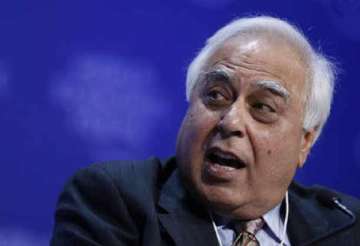New Delhi, Apr 15: With the Supreme Court upholding the constitutional validity of Right to Education Act, the government today dismissed suggestions that the burden which private schools will have to bear to implement it will be passed on to the students.
The RTE Act mandates the schools to provide free education upto 25 per cent of the students from economic weaker section between 6 to 14 years of age.
“I do not think that will happen,” Sibal said in an interview to Karan Thapar for CNN-IBN Devil's Advocate programme, adding “I think there would be ways and means to raise resources.” He said this when asked if the burden of providing free education to the 25 per cent of children will be passed on to other students.
Sibal also assured that government will take care to ensure education to the students coming from the margins of the society after Class VIII when the provisoon of the Act comes to an end.
As per the provision of ther Act, free education will be provided to the disadvantaged children from Class I to VIII.
Asked as to who will pay the tab for the 25 per cent reservation, he said under the RTE Act schools which have not taken any benefit from the government will be compensated by the government.
“The government contribution annually will vary from Rs 6000 to Rs 19,000... we have made the calculation “ Sibal said.
However, he agreed that this was not sufficient and said that during the 12th Five Year Plan, the government will provide school uniform and textbooks to students. Sibal also said that the schools can also raise resources from their fund if they have surplus resources and they can also tap the funds provided by corporates through their corporate social responsibility obligation.
“You have many corporates who are committed for corporate social responsibilities. Schools can actually tap their resources so that there is no burden on parents,” Sibal said. Asked why boarding schools have been kept out of the purview of the Act, Sibal said “they have a different ecosystem where classes generally starts from Class VI onwards.”
However, on bringing such schools under RTE fold, he said “as and when we feel they should come under purview of the act, we will think of it.”
He also rubbished the allegations that he had vested interest in keeping the boarding schools out of the RTE fold saying that the act was drafted much before he became the HRD minister.
Stressing on inclusive society, Sibal said “the gap between rich and the poor is enormous. We must move forward and we must have an inclusive society in which all must participate.”
Sibal said that Rs 2.31 lakh crore had been earmarked for implementing RTE for a period of five years.
He also made it clear that providing free education to all the children is not possible for the government and therefore they have also sought to include schools other than the government ones in providing free education to children.
“After years of deliberations we thought we must try and integrate disadvantage communities into the school. Social integration is the motive behind the move.”
Asked why the same integration is not happening in health sector which is as important like education, he said that “health sector is for Health Minister to decide but as far as education is concerned we are firm.” He noted that hospitals are required to make reservation for poor as they had got land from the government at a subsidised rate.
Latest India News
